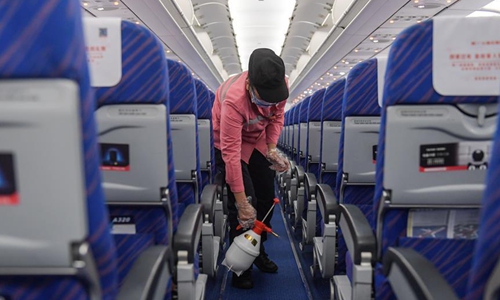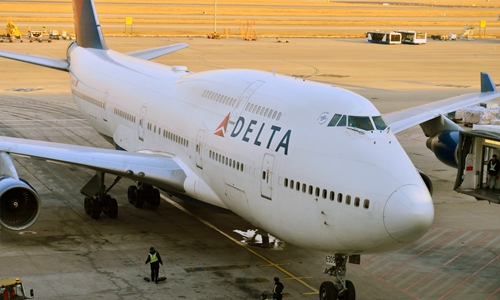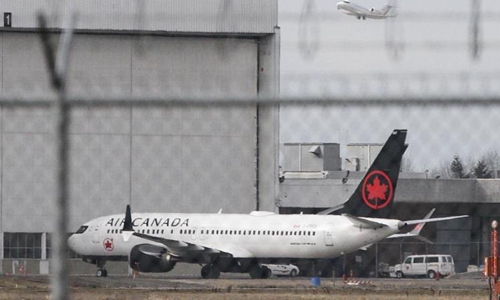Domestic airlines maintain international flights amid epidemic

A staff member disinfects the cabin of an airplane after its arrival at the Haikou Meilan International Airport in Haikou, south China's Hainan Province, Jan. 31, 2020. China Southern Airlines has strengthened its efforts on the prevention and control of the novel coronavirus, demanding all the facilities inside the cabin to be disinfected after flight. (Photo by Pu Xiaoxu/Xinhua)
Domestic airlines will maintain some international flight services to meet the basic transport demand as China's civil aviation sector faces a tough period due to the novel coronavirus outbreak.
Experts forecast the negative impact of the epidemic on the aviation industry will be serious in the short term, but could be minor in the medium and long terms.
The Civil Aviation Administration of China requires China's airlines to maintain certain international flight services to meet the cross-country transport demands of both passengers and goods amid the novel coronavirus outbreak. It has cut some flights due to reduced demand and entry restrictions imposed by other countries and regions, reported the Xinhua News Agency on Tuesday.
China's services sector has experience a dreadful holiday season - the Spring Festival holidays are usually a peak season - due to the outbreak of the novel coronavirus.
According to data from transport information provider VariFlight, 10,348 flights were canceled by 41 domestic airlines on Sunday. China Southern canceled 1,825 flights, accounting for 64.24 percent of its total planned figure. China Eastern cut 1,476 flights, accounting for 53.85 percent of the company's total schedule.
Air China canceled or reduced flights to and from overseas destinations including Singapore, Vietnam and Australia, and offered free-of-charge return policies for certain flights, according to a statement from the carrier on Sunday.
Since strict epidemic-prevention measures were implemented in late January, Revenue Passenger Kilometers (RPK) - the number of kilometers traveled by paying passengers - in January might decrease by 10 percent, but February's RPK may drop by 40 percent, forecast Qi Qi, a Guangzhou-based industry observer.
The epidemic's direct impact on the civil aviation industry will be largely short-term, likely ranging from seven to nine months, said Qi. However, the impact will be limited in the long term.
Qi forecast travel demand may see a rapid surge following a removal of the epidemic alert, due to a resumption of travel plans canceled during the outbreak period.
Additionally, governments may roll out new measures to stimulate economic activities and recoup losses brought about by the virus, which will in turn generate new travel demand, said Qi.
Liu Shengjun, a deputy director of the Institute of Air Law and Policy at the Civil Aviation University of China, told the Global Times that airlines could change some of their transport capacity from passengers to cargoes, and offer transport support for epidemic prevention efforts.
Airlines could also optimize products and facilities to lower the risk of infection among passengers, Liu said.



